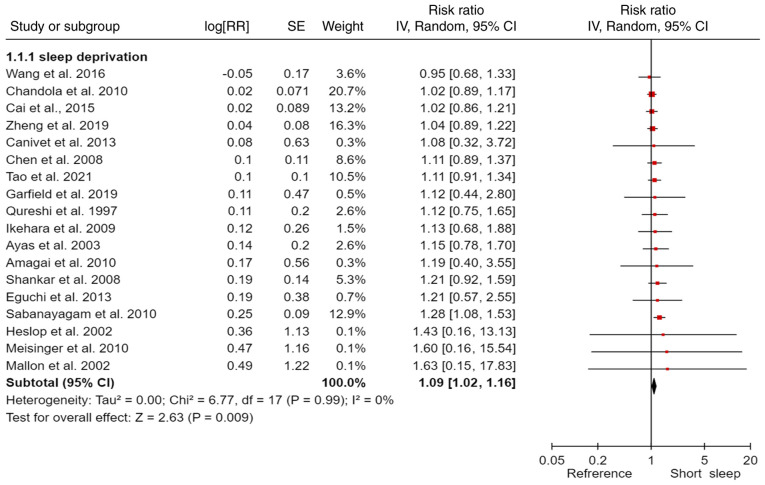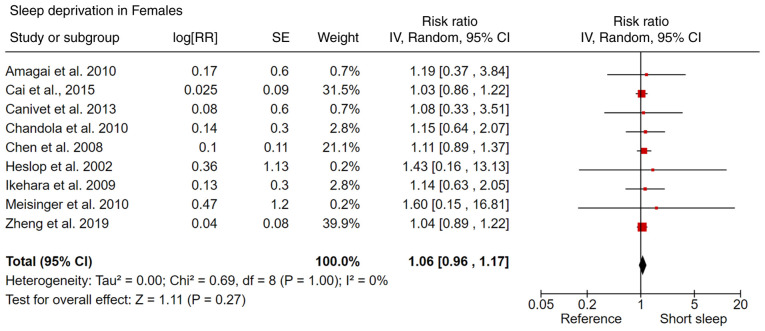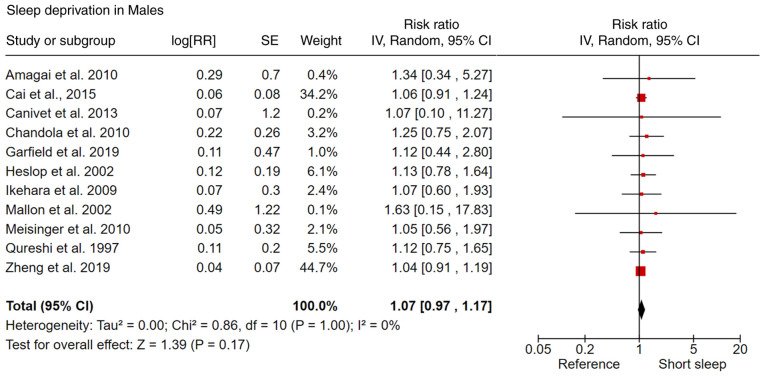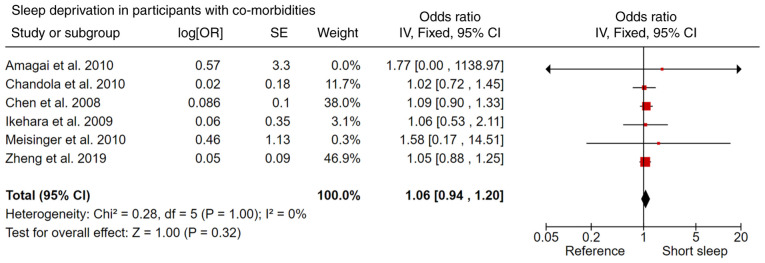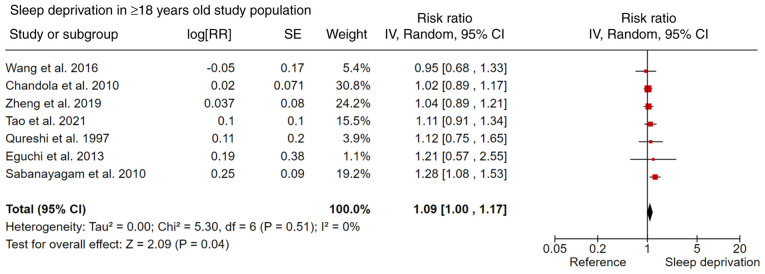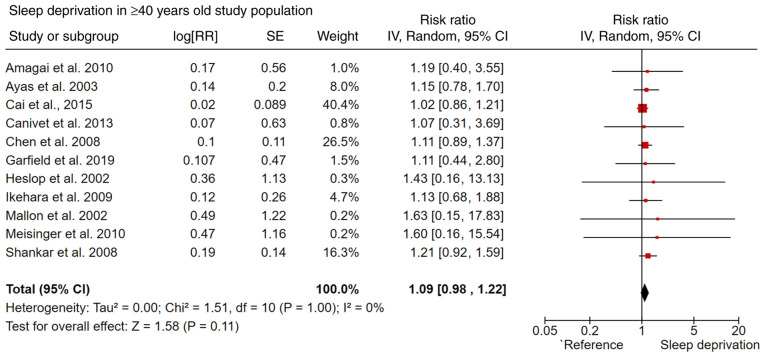The association between sleep deprivation and the risk of cardiovascular diseases: A systematic meta‑analysis (original) (raw)
Abstract
Globally, sleep deprivation is a concerning health issue associated with an increased risk of cardiovascular diseases (CVDs). The present study aimed to explore the association between short-term sleep and the risk of CVDs, taking into consideration sex and age groups. A comprehensive review was conducted by assembling cohort studies that are available in the PubMed, Cochrane Library, and Embase databases. Individuals with ≤5 or ≤6 h of sleep per day were considered as sleep-deprived subjects. To minimize potential bias, two reviewers thoroughly evaluated the selected articles. Relevant data were extracted, and pooled odds ratios (ORs) or relative risks (RRs) were calculated using a random-effects model. In total, 18 cohort studies involving adult subjects were included in the present analysis. The pooled results strongly indicated that sleep deprivation was associated with a greater risk of CVDs [RR: 1.09, 95% confidence interval (CI): 1.02-1.16, P=0.009]. However, when the pooled analysis was stratified by sex and age, the following results were observed: short-term sleep women (RR: 1.06, 95% CI: 0.96-1.17, P=0.27), short-term sleep men (RR: 1.07, 95% CI: 0.97-1.17, P=0.17); ≥18 years-old sleep-deprived population (RR: 1.09, 95% CI: 1.00-1.17, P=0.04), ≥40 years-old sleep-deprived population (RR: 1.09, 95% CI: 0.98-1.22, P=0.11), and subjects with co-existing diseases, such as diabetes and hyperlipidemia (RR: 1.06, 95% CI: 0.94-1.20, P=0.32). In conclusion, short-term sleep is associated with the increased risk of CVDs. Among subjects who were aged ≥18 years-old, there was a strong association with the development of CVDs compared with those who were aged ≥40 years-old. Furthermore, men were at a higher risk of CVDs than women. Adequate sleep (7-8 h per day) may play a role in improving cardiac health. The results of the present study may provide valuable support for further research in public health, highlighting the correlation between sleep deprivation and the risk of CVDs.
Keywords: sleep deprivation, cardiovascular diseases, insomnia, short-sleep meta-analysis, sleep disturbance
Introduction
In recent years, there has been a significant increase in research focusing on the impact of sleep on health. Sleep deprivation has been confirmed to have various detrimental effects on both mental and physical well-being. Studies have revealed that individuals who lack sufficient sleep, experience elevated levels of cortisol, a stress hormone, and increased sympathetic activities (1). Furthermore, extensive research has linked sleep deprivation to a higher risk of cardiovascular disease (CVD), diabetes and hypertension (2). Sleep plays a crucial role in the normal regulation of cardiac functions, both in healthy individuals and those with medical conditions (3). Both the quantity and quality of sleep can influence cellular immunity, and even short-term sleep loss may weaken the immune system (4,5).
In today's fast-paced world, numerous individuals are facing sleep deprivation as they juggle work and other responsibilities that appear to be never-ending. The constant availability of information, entertainment and sports contributes to the temptation of staying awake, leading individuals to willingly sacrifice their health by not getting enough rest. A survey conducted by the National Sleep Foundation in 2009 revealed that ~20% of the United States' population gets <6 h of sleep on weekdays (6). This trend is concerning, as several cohort studies have shown that short sleep duration is associated with an increased risk of health problems, particularly cardiovascular disorders (7,8). In the present era, cardiac diseases are the leading cause of mortality (9). In the USA, ~2,200 succumb to cardiovascular-related incidents each day, and ~785,000 individuals suffer from new myocardial attacks every year (10,11).
In 2012, a study revealed that the average number of sleep h for Americans was 7.18 h/day, while a significant portion of the population, 29.2%, reported getting an average of <6 h of sleep (12). This pattern of sleep duration was also observed in several other advanced countries, where the average sleep h rate aligns with that of the United States (13). Numerous systematic trials have consistently demonstrated a strong association between sleep deprivation and the development and progression of CVDs. The Morgen study conducted in the Netherlands between 1993 and 1997(14) provided evidence that short sleep duration was associated with a predicted 12-year CVD incidence, while long sleep duration showed no such association. Similarly, findings from the Jichi Medical School Cohort Study in Japan (15) indicated that male participants with sleep duration shorter than 6 h had a higher incidence risk of CVD events compared with those sleeping 7-7.9 h per night. On the other hand, a prospective study in 2015 from the MONICA-Brianza and PAMELA population-based cohorts (16) demonstrated a significant increase in the hazard ratio (HR) of CVD events for participants who slept >9 h compared with those sleeping 7-8 h per night. Contrasting results were found in a study utilizing UK Biobank cohort data (17), where both short (≤5 h) and long (≥9 h) sleep durations were associated with increased risk of CVD incidence and mortality, even after adjusting for various factors. A previous prospective cohort study from the US (18) showed that individuals sleeping ~7 h per night had the lowest CVD-specific mortality, in contrast to those who slept <6 or >8 h.
Nevertheless, a comprehensive understanding of how sleep duration is precisely related to CVD risk in a community-based general population is still lacking. Major confounding factors, including age and the presence of other diseases (such as diabetes, hypertension and obesity), may influence the findings and contribute to the varying results. Consequently, the risk of CVD could differ based on sleep duration within populations with different health statuses. In the present study, a meta-analysis was conducted in order to investigate the correlation between sleep deprivation and the risk of CVD in subgroups divided by sex, age and co-morbidity status. This may be advantageous in identifying influential factors and provide new insights into the aforementioned correlation.
Materials and methods
Search method
Multiple databases were used to collect data, including Cochrane Library (https://www.cochranelibrary.com/), PubMed (https://pubmed.ncbi.nlm.nih.gov/) and Embase databases (https://www.embase.com/). The Medical Subject Heading (MeSH) terms were ‘sleep quality’, ‘sleep deprivation’, ‘sleep disturbance’ and ‘CVD’. ‘Related articles’ were also utilized as an option in the PubMed to further expand the search, and all retrieved abstracts, studies, and citations were carefully reviewed. The systematic searches in the databases were restricted to only English-language records (19).
Eligibility criteria
The present study included the cohort studies, which determined the correlation between sleep deprivation and the risk of CVDs. The most recently published studies were included. The exclusion criteria were as follows: i) animal research, ii) unpublished data, iii) articles without proper analysis and findings, iv) research studies on children and v) unoriginal data sources, such as review articles. The characteristics of all the included studies are summarized in Table I.
Table I.
Characteristics of the included studies among sleep-deprived adults.
| Sr. no. | Authors/country | Year | Study type | Sample size | Age, years | Sex | CVDs effects | Follow-up sleep h | Follow-up period | (Refs.) |
|---|---|---|---|---|---|---|---|---|---|---|
| 1. | Ayas et al Canada | 2003 | Cohort study | 71,671 | 45-65 | Women | Short sleep (≤5 h) and long sleep (≥9 h) are strongly linked with an increased risk of CVDs | <5-8 and >9 h | 10 years | (14) |
| 2. | Chandola et al UK | 2010 | Cohort study | 3,413 women and 6,895 men | 35-55 | Women and men | Greater risk of CVDs in participants having short sleep along with sleep disturbances than persons with just short sleep pattern | <5-7 and >8 h | 15 years | (15) |
| 3. | Zheng et al China | 2019 | Cohort study | 487,200 (199,241 men and 287,959 women) | 30-79 | Women and men | Insomnia has found to elevate the risk of CVDs | ≤5 h | 10 years | (16) |
| 4. | Garfield et al UK | 2019 | Cohort study | 4,399 | 40-69 | Men | Sleep disturbances and poor sleep have strongly linked with development and progression of cardiac disorders | ≤6 h | 29 years | (17) |
| 5. | Sabanayagam et al USA | 2010 | Cohort study | 30,397 | ≥18 | Women and men | Sleep period <5 and >9 h as compared with 7 h sleep (normal sleep period) have strongly linked with risk of CVDs | <5-8 and >9 h | - | (18) |
| 6. | Amagai et al Japan | 2010 | Cohort study | 11,367 (4,413 men and 6,954 women) | 50-60 | Women and men | Individuals having <6 h of sleep are of high risk of cardiac distresses | <5-8 and >9 h | 10.7 years | (24) |
| 7. | Shankar et al Singapore | 2008 | Cohort study | 63,257 | 45-74 | Women and men | ≤5 and ≥9 h of sleep have strongly linked with incidence | <5-8 and >9 h | 4 years | (25) |
| 8. | Wang et al China | 2016 | Cohort study | 101,510 | 18-98 | Men | Insignificant association has been found between short deprivation and long sleep h with CVDs risk | <5-8 and >9 h | 3.9 years | (28) |
| 9. | Cai et al China | 2015 | Cohort study | 113,138 | 40-80 | Women and men | Longer and shorter sleep durations are associated with cardiac disabilities but subjects with longer sleep h have a high risk than shorter duration | <5-9 and >10 h | 7.12 years | (29) |
| 10. | Meisinger et al Germany | 2010 | Cohort study | 3,508 men and 3,388 women | 45-74 | Women and men | <5 sleep h induces cardiac illnesses. However, in women, the risk of developing CVDs is lower compared with males | <5-8 and >9 h | 15 years | (30) |
| 11. | Heslop et al UK | 2002 | Cohort study | 6,022 men and 1,006 women | 60-65 | Women and men | Individuals getting sleep ≤7 h found high morbidity rate and risk of CVDs than who take sleep ≥8 h per day | ≤7 and ≥8 h | 25 years | (31) |
| 12. | Ikehara et al Japan | 2009 | Cohort study | 98,634 (41,489 men and 57,145 women) | 40-79 | Women and men | Insomnia and long sleep have strongly associated with development of cardiovascular disorders, mortality and neurological disorders | <4-9 and >10 h | 14.3 years | (32) |
| 13. | Chen et al | 2008 | Cohort study | 93,175 | 50-79 | Women USA | Longer sleep is strongly linked with the risk of mortality of cardiac disorders | <5-9 and >10 h | 7.5 years | (33) |
| 14. | Mallon et al Sweden | 2002 | Cohort study | 266 (165 men and 101 women) | 45-65 | Women and men | Men having complains of sleep distress have strongly associated with risk of CVDs | <6 and >8 h | 12 years | (34) |
| 15. | Eguchi et al Japan | 2013 | Cohort study | 1,255 (476 men and 779 women) | 33-97 | Women and men | Individuals having <7 h of sleep are prone of developing cardiac distresses | ≤7 and >7 h | 4.5 years | (35) |
| 16. | Qureshi et al USA | 1997 | Cohort study | 7,844 (4,996 women and 2,848 men) | 32-75 | Women and men | Individuals with sleep duration >8 h have a high risk of CVDs | <6 and >8 h | 10 years | (36) |
| 17. | Canivet et al Sweden | 2013 | Cohort study | 4,319 | 45-64 | Women and men | Longer and shorter sleep durations are associated with cardiac disabilities | ≤6 h >9 h | 12 years | (37) |
| 18. | Tao et al UK | 2021 | Cohort study | 407,500 | 38-73 | Women and men | Longer and shorter sleep durations are associated with cardiac disabilities but individuals with longer sleep h have a higher risk than shorter duration | <5-8 and <9 h | 9.57 years | (39) |
The included studies needed to satisfy the following conditions: i) cohort studies, investigating the correlation between sleep deprivation and the risk of development and progression of CVDs, ii) adult population with sample size >100 participants, iii) involvement of adult/senior men and women and iv) the most recently published studies with proper analyses and findings (20).
Data extraction
Two investigators (KWT and JJAL) independently extracted the data. Data from the selected studies were collected and organized into a standardized data spreadsheet. The gathered information included author identity, location, publication year, sample size, sex, age, sleep h, follow-up period and the effects on CVDs. The study selection process is illustrated in the PRISMA flow chart (Fig. 1). The relative risk ratio (RR) or HR were extracted and their corresponding 95% confidence interval (CI) from the included studies. In most of the included studies, sleep deprivation was defined as having ≤5 or ≤6 h of sleep, while normal sleep was considered as 7-8 h per day. Additionally, the overall risk of CVD associated with sleep deprivation was determined by classifying the data based on sex and age (20).
Figure 1.
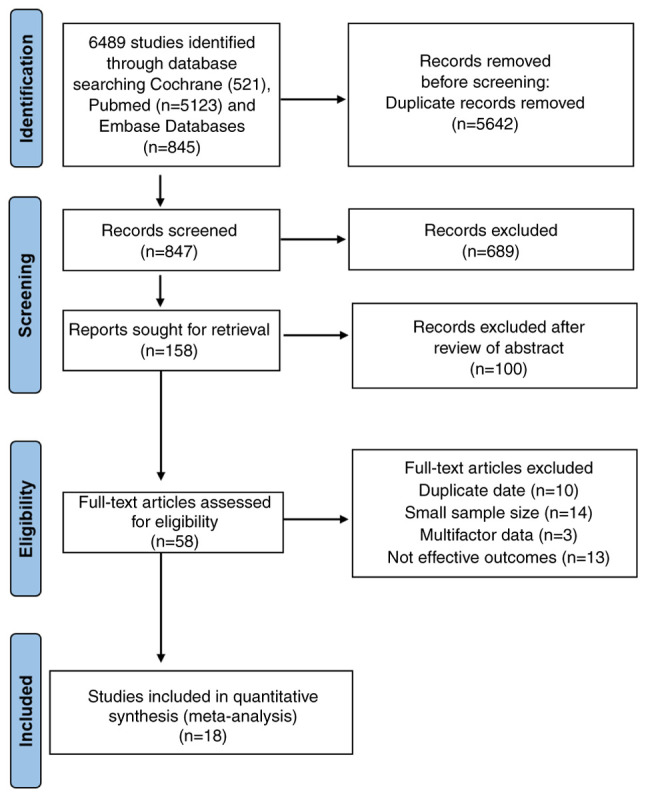
Systemic PRISMA flowchart for meta-analysis.
A Microsoft Excel spreadsheet was utilized to create a comprehensive database for the present meta-analysis. Any discrepancies in decision-making were resolved through consultation with another review author (EWL). No language restrictions were imposed during the study selection process.
Statistical analysis
The statistical analysis was performed by Review Manager 5.3 software (Cochrane). Meta-analysis was conducted in accordance with PRISMA protocols. Furthermore, RR or HR of the included studies were extracted to assess the correlation between sleep deprivation and incidence of CVDs using a random-effects model. Pooled RR and 95% CI of the CVDs for sleep deprivation were estimated. The heterogeneity among the included studies was evaluated via the Chi-squared test and the I2 statistics. A statistically significant heterogeneity was indicated if Cochran's Q-test yielded a P<0.10.
Results
Association between sleep deprivation and the risk of CVDs
A total of 18 cohort studies provided sufficient data for the meta-analysis, allowing for the estimation of the pooled effect size in relation to the association between sleep deprivation and the development and progression of CVDs. The pooled RR was found to be 1.09, with a 95% CI: 1.02-1.16 and a statistically significant P=0.009. The heterogeneity test showed I2=0% and a Chi²=6.77 (Fig. 2).
Figure 2.
Correlation between sleep deprivation and the risk of cardiovascular diseases. CI, confidence interval.
Association between sleep deprivation in women and the risk of CVDs
Out of the 18 cohort studies included in the meta-analysis, a total of 9 studies provided sufficient data to calculate the pooled effect size for sleep deprivation in women and its association with the development and progression of CVDs (RR: 1.06, 95% CI: 0.96-1.17, P=0.27; heterogeneity test; I2=0%, Chi²=0.69; Fig. 3).
Figure 3.
Correlation between sleep deprivation and the risk of cardiovascular diseases in women. CI, confidence interval.
Association between sleep deprivation in men and the risk of CVDs
Among the 18 cohort studies included in the analysis, a total of 11 studies provided sufficient data to calculate the pooled effect size for sleep deprivation in men and its association with development and progression of CVDs (RR: 1.07, 95% CI: 0.97-1.17, P=0.17; heterogeneity test; I2=0%, Chi²=0.86; Fig. 4).
Figure 4.
Correlation between sleep deprivation and the risk of cardiovascular diseases in men. CI, confidence interval.
Association between sleep deprivation and participants with comorbidities
Out of the 18 cohort studies included in the analysis, a total of 6 studies provided sufficient data to calculate the pooled effect size for the association of sleep deprivation in cases suffering from other diseases with the development and progression of CVDs (RR: 1.06, 95% CI: 0.94-1.20, P=0.32; heterogeneity test; I2=0%, Chi²=0.28; Fig. 5).
Figure 5.
Correlation between sleep deprivation and the risk of cardiovascular diseases in participants with co-morbidities. CI, confidence interval.
Association between sleep deprivation in subjects aged ≥18 years old and the risk of CVDs
Out of the 18 cohort studies included in the analysis, a total of 7 studies provided sufficient data to calculate the pooled effect size for the association of sleep deprivation in individuals who were aged ≥18 years-old with the development and progression of CVDs (RR: 1.09, 95% CI: 1.00-1.17, P=0.04; heterogeneity test; I2=0%, Chi²=5.30; Fig. 6).
Figure 6.
Correlation between sleep deprivation and the risk of cardiovascular diseases in individuals who aged ≥18 years-old. CI, confidence interval.
Association between sleep deprivation in subjects aging ≥40 years-old and the risk of CVDs
Out of the 18 cohort studies included in the analysis, all 18 studies reported adequate data to calculate the pooled effect size for the association of sleep deprivation in individuals who were aged ≥40 years old with development and progression of CVDs (RR: 1.09, 95% CI: 0.98-1.22, P=0.11; heterogeneity test; I2=0%, Chi²=1.51; Fig. 7).
Figure 7.
Correlation between sleep deprivation and the risk of cardiovascular diseases in individuals who aged ≥40 years-old. CI, confidence interval.
Discussion
Sleep is essential for physical health and mental well-being, facilitating bodily restoration and cognitive functions. Sleep deprivation can have adverse effects on both physical and mental health, leading to fatigue, reduced concentration, increased stress and irritability. Additionally, sleep disturbances and short sleep duration have been associated with reduced productivity, impaired decision-making, and various health issues, including diabetes mellitus, cardiac disorders and depression (21). Over the past century in the United States, the average time spent sleeping has significantly decreased, from 9 h in 1910 to 7.5 h in 1975 and 6.8 h in 2005(22). In Japan, 21.4% of the population suffers from insomnia (23). Investigational studies have indicated that sleeping disorders may contribute to the development of CVDs (24). Both long- and short-term sleep have been noted to be associated with an increased risk of CVDs. However, it has been reported that, in comparison to insomnia, long-term sleep is more strongly associated with an increased risk of cardiac illnesses (14,25). A comprehensive meta-analysis was conducted to explore the correlation between short sleep and the risk of CVDs, categorizing the data into subgroups based on sex and age. The present study is the first to provide insights into the relationship between sleep deprivation and CVD risk using population-based cohort studies of adults. The findings of the present study indicate an increased risk of CVDs among both sleep-deprived women and men. However, the association varied depending on age groups and sex. Among women, the pooled analysis showed a weak and statistically insignificant link between sleep deprivation (sleeping <5 or 6 h) and an increased risk of development and progression of CVDs. By contrast, for sleep-deprived men, the association with the risk of CVDs was even weaker than in women. Moreover, among the population aged >18 years, the pooled analysis demonstrated a strong association with a greater risk of development and progression of CVDs. However, among those aged >40 years, the association with the risk of CVD was weak and statistically insignificant. Out of the 18 studies, six cohort studies provided RR of CVD risk among sleep-deprived individuals who also suffered from other health complications, including hypertension, diabetes mellitus and hyperlipidemia. The pooled analysis among these individuals showed a weak and statistically insignificant association with a greater risk of progression and development of CVDs
Regarding the association between sleep deprivation and CVD risk, several underlying mechanisms may be involved. Sleep deprivation can disrupt the body's hormonal balance, leading to alterations in hormone secretion. Specifically, inadequate sleep may result in increased levels of cortisol, commonly known as the stress hormone. Elevated cortisol levels can contribute to insulin resistance, inflammation and hypertension, all of which are risk factors for CVD. Chronic sleep deprivation can trigger a state of chronic low-grade inflammation in the body. This sustained inflammatory response is associated with the development and progression of atherosclerosis, a condition characterized by the buildup of plaque in the arteries. Inflammation plays a key role in promoting the formation of arterial plaques and increasing the risk of cardiovascular events. Sleep deprivation can disrupt the balance between the sympathetic and parasympathetic branches of the autonomic nervous system. This imbalance can lead to increased sympathetic activity, which is linked to elevated heart rate, blood pressure and reduced heart rate variability, all of which contribute to cardiovascular dysfunction. Sleep deprivation has been shown to impair endothelial function, which refers to the health and responsiveness of the cells lining the blood vessels. Endothelial dysfunction can result in reduced vasodilation capacity and increased vascular resistance, further promoting CVD development. Chronic sleep deprivation is associated with disturbances in glucose metabolism and insulin sensitivity, which can contribute to the development of type 2 diabetes. Diabetes is a significant risk factor for CVD, as it accelerates the progression of atherosclerosis and increases the likelihood of cardiovascular events (41-43).
Sleep deprivation has been strongly linked to an increased risk of developing cardiovascular disorders. Numerous studies have shown that individuals who do not get enough sleep or experience frequent sleep disturbances are at a higher risk of developing conditions, such as coronary artery disease (CAD), myocardial infarction, stroke, high blood pressure and diabetes (26-28). Furthermore, lack of sleep has been associated with elevated levels of inflammation and stress hormones, which can further contribute to the risk of cardiovascular disorders. Additionally, insomnia and other sleep disorders have been found to be linked to feelings of depression and anxiety, which can act as additional inducers of CVDs (29-31).
The findings of the present study are consistent with previous meta-analysis studies on the association between sleep duration and the risk of CVDs. In a meta-analysis review conducted in 2011, it was demonstrated that short-term sleep was associated with elevated incidence rates of various CVDs, including stroke and coronary heart disease (CHD) (32-34). Furthermore, another meta-analysis concentrated on investigating the relationship between sleep duration and the risk of cardiac illnesses, and it provided evidence that short-term sleep was strongly associated with an increased risk of heart failure (HF) and stroke (35-37). Cheong et al (38) confirmed that concentration on the interactions between the host and gut microbiota may be promising for the prevention or treatment of CVD. Previous observational studies, supported by meta-analyses, have consistently indicated an association between short sleep duration and increased risk of CVDs, such as CAD, HF and stroke (39-42). Additionally, short sleep duration has been linked to various cardiovascular risk factors, including type 2 diabetes and overweight (43-46). Moreover, meta-analyses of observational studies have further confirmed that short sleep duration could serve as an independent risk factor for CHD and is associated with higher risks of all-cause and cardiovascular mortalities (47-49). Regarding stroke, observational studies have suggested that short sleep duration is associated with an elevated risk of stroke (50-53), and a meta-analysis of such studies further substantiated this finding (54). However, a more recent dose-response meta-analysis (55) reported contrasting results, showing an association between long sleep duration and an increased risk of stroke.
Therefore, it has been suggested that achieving a sleep duration of 7-8 h per day could potentially yield positive impacts on cardiac health. However, it is essential to acknowledge the limitations to the present study, which could potentially compromise its accuracy. Certain of these limitations include the reliance on self-reported sleep duration in numerous of the included studies, variations in follow-up periods, different analytical measurement approaches (for example, questionnaires) used across the studies, and the absence of subjective estimates of sleep length in certain studies. Additionally, a methodological quality assessment of the included studies was not conducted, which may influence the overall reliability of the present findings.
There are still numerous research directions about sleep deprivation and the risk of CVDs. For example, future research may focus on the degree of sleep deprivation on the increased risk of CVDs, and whether the detrimental effect of sleep deprivation on cardiac health is reversible. In addition, the exact mechanism of an increased risk of CVDs after sleep deprivation also remains to be investigated in the future.
In conclusion, the present study indicated that sleep deprivation, characterized by ≤5 or ≤6 h of sleep per day, increased the risk of CVDs. Notably, it was revealed that the risk of CVDs was higher in men compared with women. Furthermore, subjects who were aged ≥18 years-old exhibited a significant association with development of CVDs, whereas the association was weaker in those who were aged ≥40 years old. Based on these findings, it was suggested that sleep-deprived individuals consider extending their sleep duration to the recommended 7-8 h per day to potentially improve their cardiac health. The results of the present study may provide valuable support for further research in public health, highlighting the correlation between sleep deprivation and the risk of CVDs.
Acknowledgements
Not applicable.
Funding Statement
Funding: No funding was received.
Availability of data and materials
The datasets used and/or analyzed during the current study are available from the corresponding author on reasonable request.
Authors' contributions
YP and WL conceived and designed the study. WL provided administrative support. YP, YZ, XS and SH collected data. All authors participated in data analysis and interpretation, writing process, reading and approval of the final version of the manuscript. YP and WL confirm authenticity of all the raw data.
Ethics approval and consent to participate
Not applicable.
Patient consent for publication
Not applicable.
Competing interests
The authors declare that they have no competing interests.
References
- 1.Khan MS, Aouad R. The effects of insomnia and sleep loss on cardiovascular disease. Sleep Med Clin. 2017;12:167–177. doi: 10.1016/j.jsmc.2017.01.005. [DOI] [PubMed] [Google Scholar]
- 2.Cappuccio FP, Stranges S, Kandala NB, Miller MA, Taggart FM, Kumari M, Ferrie JE, Shipley MJ, Brunner EJ, Marmot MG. Gender-specific associations of short sleep duration with prevalent and incident hypertension: The Whitehall II study. Hypertension. 2007;50:693–700. doi: 10.1161/HYPERTENSIONAHA.107.095471. [DOI] [PMC free article] [PubMed] [Google Scholar]
- 3.Wolk R, Gami AS, Garcia-Touchard A, Somers VK. Sleep and cardiovascular disease. Curr Probl Cardiol. 2005;30:625–662. doi: 10.1016/j.cpcardiol.2005.07.002. [DOI] [PubMed] [Google Scholar]
- 4.Irwin M. Effects of sleep and sleep loss on immunity and cytokines. Brain Behav Immun. 2002;16:503–512. doi: 10.1016/s0889-1591(02)00003-x. [DOI] [PubMed] [Google Scholar]
- 5.Spiegel K, Sheridan JF, Van*Cauter E. Effect of sleep deprivation on response to immunizaton. JAMA. 2002;288:1471–1472. doi: 10.1001/jama.288.12.1471-a. [DOI] [PubMed] [Google Scholar]
- 6.Kerkhofs M, Boudjeltia KZ. From total sleep deprivation to cardiovascular disease: A key role for the immune system? Sleep. 2012;35:895–896. doi: 10.5665/sleep.1938. [DOI] [PMC free article] [PubMed] [Google Scholar]
- 7.Nagai M, Hoshide S, Kario K. Sleep duration as a risk factor for cardiovascular disease-a review of the recent literature. Curr Cardiol Rev. 2010;6:54–61. doi: 10.2174/157340310790231635. [DOI] [PMC free article] [PubMed] [Google Scholar]
- 8.Spiegel K, Tasali E, Leproult R, Van*Cauter E. Effects of poor and short sleep on glucose metabolism and obesity risk. Nat Rev Endocrinol. 2009;5:253–261. doi: 10.1038/nrendo.2009.23. [DOI] [PMC free article] [PubMed] [Google Scholar]
- 9.Gangwisch JE, Heymsfield SB, Boden-Albala B, Buijs RM, Kreier F, Pickering TG, Rundle AG, Zammit GK, Malaspina D. Short sleep duration as a risk factor for hypertension: Analyses of the first national health and nutrition examination survey. Hypertension. 2006;47:833–839. doi: 10.1161/01.HYP.0000217362.34748.e0. [DOI] [PubMed] [Google Scholar]
- 10.Schwartz S, McDowell Anderson W, Cole SR, Cornoni-Huntley J, Hays JC, Blazer D. Insomnia and heart disease: A review of epidemiologic studies. J Psychosom Res. 1999;47:313–333. doi: 10.1016/s0022-3999(99)00029-x. [DOI] [PubMed] [Google Scholar]
- 11.Schwartz SW, Cornoni-Huntley J, Cole SR, Hays JC, Blazer DG, Schocken DD. Are sleep complaints an independent risk factor for myocardial infarction? Ann Epidemiol. 1998;8:384–392. doi: 10.1016/s1047-2797(97)00238-x. [DOI] [PubMed] [Google Scholar]
- 12.Ford ES, Cunningham TJ, Croft JB. Trends in self-reported sleep duration among US adults from 1985 to 2012. Sleep. 2015;38:829–832. doi: 10.5665/sleep.4684. [DOI] [PMC free article] [PubMed] [Google Scholar]
- 13.Bin YS, Marshall NS, Glozier N. Sleeping at the limits: The changing prevalence of short and long sleep durations in 10 countries. Am J Epidemiol. 2013;177:826–833. doi: 10.1093/aje/kws308. [DOI] [PubMed] [Google Scholar]
- 14.Ayas NT, White DP, Manson JE, Stampfer MJ, Speizer FE, Malhotra A, Hu FB. A prospective study of sleep duration and coronary heart disease in women. Arch Intern Med. 2003;163:205–209. doi: 10.1001/archinte.163.2.205. [DOI] [PubMed] [Google Scholar]
- 15.Chandola T, Ferrie JE, Perski A, Akbaraly T, Marmot MG. The effect of short sleep duration on coronary heart disease risk is greatest among those with sleep disturbance: A prospective study from the Whitehall II cohort. Sleep. 2010;33:739–744. doi: 10.1093/sleep/33.6.739. [DOI] [PMC free article] [PubMed] [Google Scholar]
- 16.Zheng B, Yu C, Lv J, Guo Y, Bian Z, Zhou M, Yang L, Chen Y, Li X, Zou J, et al. Insomnia symptoms and risk of cardiovascular diseases among 0.5 million adults: A 10-year cohort. Neurology. 2019;93:e2110–e2120. doi: 10.1212/WNL.0000000000008581. [DOI] [PMC free article] [PubMed] [Google Scholar]
- 17.Garfield V, Joshi R, Garcia-Hernandez J, Tillin T, Chaturvedi N. The relationship between sleep quality and all-cause, CVD and cancer mortality: The Southall and Brent REvisited study (SABRE) Sleep Med. 2019;60:230–235. doi: 10.1016/j.sleep.2019.03.012. [DOI] [PMC free article] [PubMed] [Google Scholar]
- 18.Sabanayagam C, Shankar A. Sleep duration and cardiovascular disease: Results from the national health interview survey. Sleep. 2010;33:1037–1042. doi: 10.1093/sleep/33.8.1037. [DOI] [PMC free article] [PubMed] [Google Scholar]
- 19.Cappuccio FP, Cooper D, D'Elia L, Strazzullo P, Miller MA. Sleep duration predicts cardiovascular outcomes: A systematic review and meta-analysis of prospective studies. Eur Heart J. 2011;32:1484–1492. doi: 10.1093/eurheartj/ehr007. [DOI] [PubMed] [Google Scholar]
- 20.Wang S, Li Z, Wang X, Guo S, Sun Y, Li G, Zhao C, Yuan W, Li M, Li X, Ai S. Associations between sleep duration and cardiovascular diseases: A meta-review and meta-analysis of observational and Mendelian randomization studies. Front Cardiovasc Med. 2022;9(930000) doi: 10.3389/fcvm.2022.930000. [DOI] [PMC free article] [PubMed] [Google Scholar]
- 21.Ramar K, Malhotra RK, Carden KA, Martin JL, Abbasi-Feinberg F, Aurora RN, Kapur VK, Olson EJ, Rosen CL, Rowley JA, et al. Sleep is essential to health: An American academy of sleep medicine position statement. J Clin Sleep Med. 2021;17:2115–2119. doi: 10.5664/jcsm.9476. [DOI] [PMC free article] [PubMed] [Google Scholar]
- 22.Hiestand DM, Britz P, Goldman M, Phillips B. Prevalence of symptoms and risk of sleep apnea in the US population: Results from the national sleep foundation sleep in America 2005 poll. Chest. 2006;130:780–786. doi: 10.1378/chest.130.3.780. [DOI] [PubMed] [Google Scholar]
- 23.Kim K, Uchiyama M, Okawa M, Liu X, Ogihara R. An epidemiological study of insomnia among the Japanese general population. Sleep. 2000;23:41–47. [PubMed] [Google Scholar]
- 24.Amagai Y, Ishikawa S, Gotoh T, Kayaba K, Nakamura Y, Kajii E. Sleep duration and incidence of cardiovascular events in a Japanese population: The Jichi medical school cohort study. J Epidemiol. 2010;20:106–110. doi: 10.2188/jea.je20090053. [DOI] [PMC free article] [PubMed] [Google Scholar]
- 25.Shankar A, Koh WP, Yuan JM, Lee HP, Yu MC. Sleep duration and coronary heart disease mortality among Chinese adults in Singapore: A population-based cohort study. Am J Epidemiol. 2008;168:1367–1373. doi: 10.1093/aje/kwn281. [DOI] [PMC free article] [PubMed] [Google Scholar]
- 26.Covassin N, Singh P. Sleep duration and cardiovascular disease risk: Epidemiologic and experimental evidence. Sleep Med Clin. 2016;11:81–89. doi: 10.1016/j.jsmc.2015.10.007. [DOI] [PMC free article] [PubMed] [Google Scholar]
- 27.Javaheri S, Redline S. Insomnia and risk of cardiovascular disease. Chest. 2017;152:435–444. doi: 10.1016/j.chest.2017.01.026. [DOI] [PMC free article] [PubMed] [Google Scholar]
- 28.Wang X, Liu X, Song Q, Wu S. Sleep duration and risk of myocardial infarction and all-cause death in a Chinese population: The Kailuan study. Sleep Med. 2016;19:13–16. doi: 10.1016/j.sleep.2015.09.027. [DOI] [PubMed] [Google Scholar]
- 29.Cai H, Shu XO, Xiang YB, Yang G, Li H, Ji BT, Gao J, Gao YT, Zheng W. Sleep duration and mortality: A prospective study of 113 138 middle-aged and elderly Chinese men and women. Sleep. 2015;38:529–536. doi: 10.5665/sleep.4564. [DOI] [PMC free article] [PubMed] [Google Scholar]
- 30.Meisinger C, Heier M, Löwel H, Schneider A, Döring A. Sleep duration and sleep complaints and risk of myocardial infarction in middle-aged men and women from the general population: The MONICA/KORA Augsburg cohort study. Sleep. 2007;30:1121–1127. doi: 10.1093/sleep/30.9.1121. [DOI] [PMC free article] [PubMed] [Google Scholar]
- 31.Heslop P, Smith GD, Metcalfe C, Macleod J, Hart C. Sleep duration and mortality: The effect of short or long sleep duration on cardiovascular and all-cause mortality in working men and women. Sleep Med. 2002;3:305–314. doi: 10.1016/s1389-9457(02)00016-3. [DOI] [PubMed] [Google Scholar]
- 32.Ikehara S, Iso H, Date C, Kikuchi S, Watanabe Y, Wada Y, Inaba Y, Tamakoshi A. Association of sleep duration with mortality from cardiovascular disease and other causes for Japanese men and women: the JACC study. Sleep. 2009;32:295–301. doi: 10.1093/sleep/32.3.295. JACC Study Group. [DOI] [PMC free article] [PubMed] [Google Scholar]
- 33.Chen JC, Brunner RL, Ren H, Wassertheil-Smoller S, Larson JC, Levine DW, Allison M, Naughton MJ, Stefanick ML. Sleep duration and risk of ischemic stroke in postmenopausal women. Stroke. 2008;39:3185–3192. doi: 10.1161/STROKEAHA.108.521773. [DOI] [PMC free article] [PubMed] [Google Scholar]
- 34.Mallon L, Broman JE, Hetta J. Sleep complaints predict coronary artery disease mortality in males: A 12-year follow-up study of a middle-aged Swedish population. J Intern Med. 2002;251:207–216. doi: 10.1046/j.1365-2796.2002.00941.x. [DOI] [PubMed] [Google Scholar]
- 35.Eguchi K, Pickering TG, Schwartz JE, Hoshide S, Ishikawa J, Ishikawa S, Shimada K, Kario K. Short sleep duration as an independent predictor of cardiovascular events in Japanese patients with hypertension. Arch Intern Med. 2008;168:2225–2231. doi: 10.1001/archinte.168.20.2225. [DOI] [PMC free article] [PubMed] [Google Scholar]
- 36.Qureshi AI, Giles WH, Croft JB, Bliwise DL. Habitual sleep patterns and risk for stroke and coronary heart disease: A 10-year follow-up from NHANES I. Neurology. 1997;48:904–911. doi: 10.1212/wnl.48.4.904. [DOI] [PubMed] [Google Scholar]
- 37.Canivet C, Staland-Nyman C, Lindeberg SI, Karasek R, Moghaddassi M, Östergren PO. Insomnia symptoms, sleep duration, and disability pensions: A prospective study of Swedish workers. Int J Behav Med. 2014;21:319–328. doi: 10.1007/s12529-013-9315-0. [DOI] [PubMed] [Google Scholar]
- 38.Cheong KL, Yu B, Chen J, Zhong S. A comprehensive review of the cardioprotective effect of marine algae polysaccharide on the gut microbiota. Foods. 2022;11(3550) doi: 10.3390/foods11223550. [DOI] [PMC free article] [PubMed] [Google Scholar]
- 39.Tao F, Cao Z, Jiang Y, Fan N, Xu F, Yang H, Li S, Zhang Y, Zhang X, Sun L, Wang Y. Associations of sleep duration and quality with incident cardiovascular disease, cancer, and mortality: A prospective cohort study of 407,500 UK biobank participants. Sleep Med. 2021;81:401–409. doi: 10.1016/j.sleep.2021.03.015. [DOI] [PubMed] [Google Scholar]
- 40.Lao XQ, Liu X, Deng HB, Chan TC, Ho KF, Wang F, Vermeulen R, Tam T, Wong MCS, Tse LA, et al. Sleep quality, sleep duration, and the risk of coronary heart disease: A prospective cohort study with 60,586 adults. J Clin Sleep Med. 2018;14:109–117. doi: 10.5664/jcsm.6894. [DOI] [PMC free article] [PubMed] [Google Scholar]
- 41.Li W, Taskin T, Gautam P, Gamber M, Sun W. Is there an association among sleep duration, nap, and stroke? Findings from the China health and retirement longitudinal study. Sleep Breath. 2021;25:315–323. doi: 10.1007/s11325-020-02118-w. [DOI] [PubMed] [Google Scholar]
- 42.Wannamethee SG, Papacosta O, Lennon L, Whincup PH. Self-reported sleep duration, napping, and incident heart failure: Prospective associations in the British regional heart study. J Am Geriatr Soc. 2016;64:1845–1850. doi: 10.1111/jgs.14255. [DOI] [PMC free article] [PubMed] [Google Scholar]
- 43.Anothaisintawee T, Reutrakul S, Van Cauter E, Thakkinstian A. Sleep disturbances compared to traditional risk factors for diabetes development: Systematic review and meta-analysis. Sleep Med Rev. 2016;30:11–24. doi: 10.1016/j.smrv.2015.10.002. [DOI] [PubMed] [Google Scholar]
- 44.Cappuccio FP, Taggart FM, Kandala NB, Currie A, Peile E, Stranges S, Miller MA. Meta-analysis of short sleep duration and obesity in children and adults. Sleep. 2008;31:619–626. doi: 10.1093/sleep/31.5.619. [DOI] [PMC free article] [PubMed] [Google Scholar]
- 45.Covassin N, Singh P, Mccrady-Spitzer SK, St Louis EK, Calvin AD, Levine JA, Somers VK. Effects of experimental sleep restriction on energy intake, energy expenditure, and visceral obesity. J Am Coll Cardiol. 2022;79:1254–1265. doi: 10.1016/j.jacc.2022.01.038. [DOI] [PMC free article] [PubMed] [Google Scholar]
- 46.Grandner MA, Hale L, Moore M, Patel NP. Mortality associated with short sleep duration: The evidence, the possible mechanisms, and the future. Sleep Med Rev. 2010;14:191–203. doi: 10.1016/j.smrv.2009.07.006. [DOI] [PMC free article] [PubMed] [Google Scholar]
- 47.Itani O, Jike M, Watanabe N, Kaneita Y. Short sleep duration and health outcomes: A systematic review, meta-analysis, and meta-regression. Sleep Med. 2017;32:246–256. doi: 10.1016/j.sleep.2016.08.006. [DOI] [PubMed] [Google Scholar]
- 48.Lian X, Gu J, Wang S, Yan J, Chen X, Wang M, Zhang Y, Wang L. Effects of sleep habits on acute myocardial infarction risk and severity of coronary artery disease in Chinese population. BMC Cardiovasc Disord. 2021;21(481) doi: 10.1186/s12872-021-02251-8. [DOI] [PMC free article] [PubMed] [Google Scholar]
- 49.Ye Y, Zhang L, Wang A, Wang Y, Wang S, Ning G, Mu Y. Association of sleep duration with stroke, myocardial infarction, and tumors in a Chinese population with metabolic syndrome: A retrospective study. Lipids Health Dis. 2020;19(155) doi: 10.1186/s12944-020-01328-1. [DOI] [PMC free article] [PubMed] [Google Scholar]
- 50.Von Ruesten A, Weikert C, Fietze I, Boeing H. Association of sleep duration with chronic diseases in the European prospective investigation into cancer and nutrition (EPIC)-potsdam study. PLoS One. 2012;7(e30972) doi: 10.1371/journal.pone.0030972. [DOI] [PMC free article] [PubMed] [Google Scholar]
- 51.Ge B, Guo X. Short and long sleep durations are both associated with increased risk of stroke: A meta-analysis of observational studies. Int J Stroke. 2015;10:177–184. doi: 10.1111/ijs.12398. [DOI] [PubMed] [Google Scholar]
- 52.Tobaldini E, Costantino G, Solbiati M, Cogliati C, Kara T, Nobili L, Montano N. Sleep, sleep deprivation, autonomic nervous system and cardiovascular diseases. Neurosci Biobehav Rev. 2017;74:321–329. doi: 10.1016/j.neubiorev.2016.07.004. [DOI] [PubMed] [Google Scholar]
- 53.Cherubini JM, Cheng JL, Williams JS, Macdonald MJ. Sleep deprivation and endothelial function: Reconciling seminal evidence with recent perspectives. Am J Physiol Heart Circ Physiol. 2021;320:H29–H35. doi: 10.1152/ajpheart.00607.2020. [DOI] [PubMed] [Google Scholar]
- 54.Hoddy KK, Potts KS, Bazzano LA, Kirwan JP. Sleep extension: A potential target for obesity treatment. Curr Diab Rep. 2020;20(81) doi: 10.1007/s11892-020-01360-6. [DOI] [PMC free article] [PubMed] [Google Scholar]
- 55.Stock AA, Lee S, Nahmod NG, Chang AM. Effects of sleep extension on sleep duration, sleepiness, and blood pressure in college students. Sleep Health. 2020;6:32–39. doi: 10.1016/j.sleh.2019.10.003. [DOI] [PubMed] [Google Scholar]
Associated Data
This section collects any data citations, data availability statements, or supplementary materials included in this article.
Data Availability Statement
The datasets used and/or analyzed during the current study are available from the corresponding author on reasonable request.
